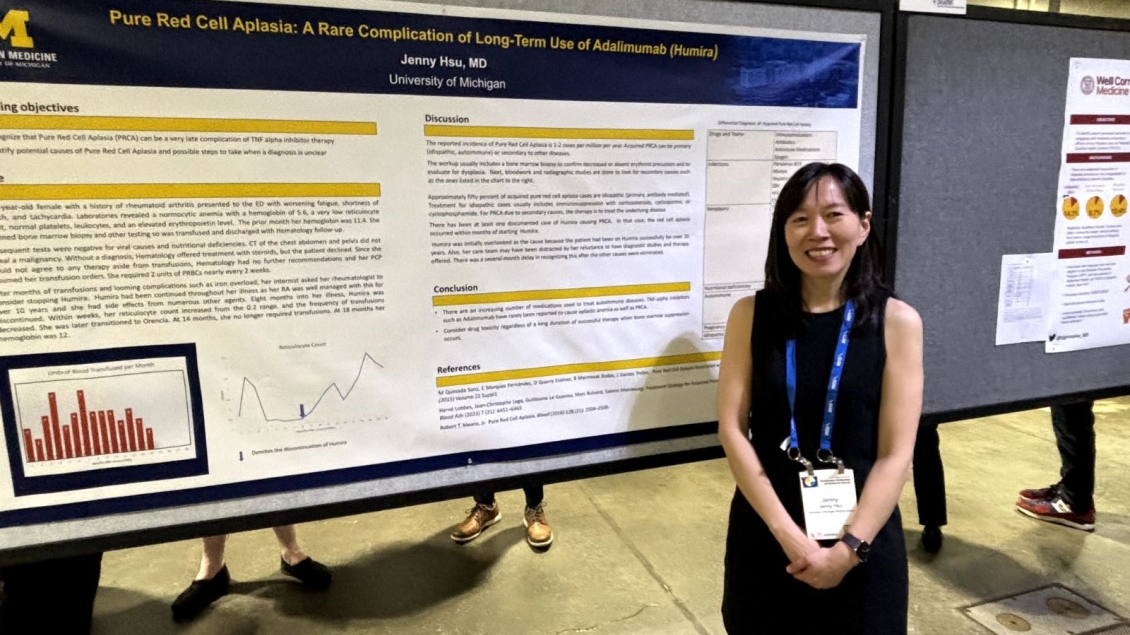-
Allergy & Clinical Immunology -
Cardiovascular Medicine -
Gastroenterology & Hepatology -
General Medicine -
Genetic Medicine -
Geriatric & Palliative Medicine -
Hematology & Oncology -
Hospital Medicine -
Infectious Diseases -
Metabolism, Endocrinology & Diabetes -
Nephrology -
Pulmonary & Critical Care Medicine -
Rheumatology

The U-M Medical School Department of Internal Medicine's Division of General Medicine is home to faculty with innovative and diverse research interests. We study how the health system works, how to improve healthcare delivery so that everyone can get patient-centered, high-quality care, and how to advance the health of our communities and the nation, including areas such as:
- delivery of healthcare
- healthcare outcomes
- cost of healthcare and pharmaceuticals
- care of the disadvantaged and other vulnerable populations
- history of medicine
- special issues in the care of patients with multiple diseases
Many of our faculty members conduct research and hold leadership roles in a number of research centers and programs at Michigan Medicine and the VA Ann Arbor Healthcare System.
Cancer Surveillance and Outcomes Research Team (CanSORT)
The Cancer Surveillance and Outcomes Research Team (CanSORT) is a multidisciplinary group of investigators based at Michigan Medicine and the VA Center for Clinical Management Research representing the fields of internal medicine, surgery, radiation, oncology, nursing, behavioral science, health services research, biostatistics and epidemiology. Our investigators are located at five universities and cancer centers throughout the United States.
CanSORT studies the quality of cancer care across the continuum of care from prevention to survivorship. The team also develops and evaluates interventions to improve cancer care including decision tools for patients and clinicians, and dissemination strategies to more quickly move research results to the provider community.
Center for Health Communications Research (CHCR)
The Center for Health Communications Research (CHCR) is a dedicated team integrating behavioral science, technology and art to create and research health interventions that inspire informed health decisions, broaden access to health information and advance the field of health communications.Center for Value-Based Insurance Design (V-BID)
The Center for Value-Based Insurance Design, is built on the principle of lowering or removing financial barriers to essential, high-value clinical services. V-BID plans align patients’ out-of-pocket costs, such as copayments, with the value of services. By reducing barriers to high-value treatments (through lower costs to patients) and discouraging low-value treatments (through higher costs to patients), these plans can achieve improved health outcomes at any level of health care expenditure.
Cognitive Health Services Research Program
The Cognitive Health Services Research Program conducts innovative research in cognitive impairment and dementia that informs health care policies, guides clinical decision making and improves the health and well-being of individuals.
Program to Accelerate Research and Delivery Innovations in General Medicine (PARADIGM)
PARADIGM is a signature program in the division that seeks to create opportunities to find long-term solutions for improving how primary care is organized and delivered to optimize healthcare value, clinician well-being and patient-centered outcomes. Clinical faculty will submit proposals for projects and work with a research faculty member, the PARADIGM project team and division leadership to implement projects in the clinical setting.
VA Center for Clinical Management Research (CCMR)
The VA Center for Clinical Management Research (CCMR) is a VA Health Services Research and Development Center of Innovation located in Ann Arbor, MI with over 40 investigators, 150 staff and annual extramural funding of over $18 million. The CCMR's vision is to improve the quality, effectiveness, safety and efficiency of Veterans’ healthcare through research and partnerships that are driven by important challenges in clinical management.
In 2023, our 33 research faculty members had over 250 publications. In addition, we have over 30 federal grants.
- Sumit Agarwal, MD, PhD, MPH
- Lawrence An, MD
- John Ayanian, MD, MPP
- Nora Becker, MD, PhD
- Steven Bernstein, MD, MPH
- Alexander Chaitoff, MD, MPH
- HwaJung Choi, PhD
- A. Mark Fendrick, MD
- Susan Goold, MD, MHSA, MA, FACP
- Dina Griauzde, MD, MSc
- Sarah Hawley, PhD, MPH
- Rodney Hayward, MD
- Michele Heisler, MD, MPA
- James Henderson, PhD
- Timothy Hofer, MD, MSc
- Joel Howell, MD, PhD
- Bradley Iott, PhD, MPH, MS
- Cornelius James, MD
- Steven Katz, MD, MPH
- Eve Kerr, MD, MPH, MACP
- Catherine Kim, MD, MPH
- Sarah Krein, PhD, RN
- Jeffrey Kullgren, MD, MS, MPH
- Pooja Lagisetty, MD, MSc
- Kenneth Langa, MD, PhD
- Deborah Levine, MD, MPH
- Rajesh Mangrulkar, MD
- Adam Markovitz, MD, PhD
- Laurence McMahon Jr., MD, MPH
- Jennifer Meddings, MD, MSc, FACP, FAAP
- Archana Radhakrishnan, MD, MHS
- Jeremy Sussman, MD, MSc
- Renuka Tipirneni, MD, MSc
- Lauren Wallner, PhD, MPH
- Brent Williams, MD, MPH
My career path as a generalist provided me the opportunity to pursue multiple, diverse research areas and practice medicine across the entire spectrum of clinical care. This flexibility enabled me to work closely with colleagues from several medical and nonmedical disciplines who contributed significantly to my personal and professional growth.






